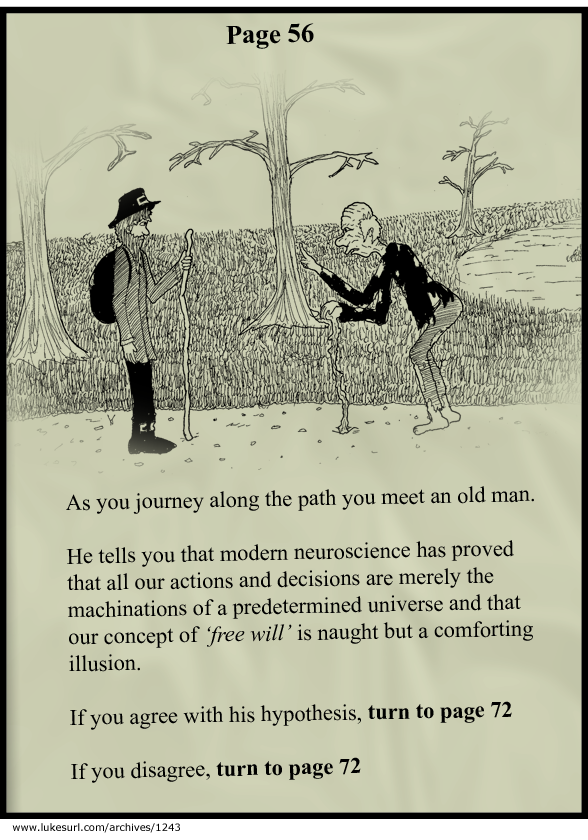What if Darwin's theory of natural selection is inaccurate? What if the way you live now affects the life expectancy of your descendants? Evolutionary thinking is having a revolution . . .
-

- The Guardian, Friday 19 March 2010
- Article history

Epigenetics suggests your lifestyle could affect the lifespan of your grandchildren. Photograph: Zena Hollyway/Corbis
The scientists are baffled, until a Christian member of the team dimly recalls something and rushes to fetch a Bible. He thumbs through it until he reaches the Book of Joshua, chapter 10, in which Joshua asks God to stop the world for . . . "about a full day!" Uproar in the computer lab. The astronomers have happened upon proof that God controls the universe on a day-to-day basis, that the Bible is literally true, and that by extension the "myth" of creation is, in fact, a reality. Darwin was wrong – according to another creationist rumour, he'd recanted on his deathbed, anyway – and here, at last, is scientific evidence!
Inevitably, those of us who aren't professional scientists have to take a lot of science on trust. And one of the things that makes it so easy to trust the standard view of evolution, in particular, is amply illustrated by the legend of the Nasa astronomers: the doubters are so deluded or dishonest that one needn't waste time with them. Unfortunately, that also makes it embarrassingly awkward to ask a question that seems, in the light of recent studies and several popular books, to be growing ever more pertinent. What if Darwin's theory of evolution – or, at least, Darwin's theory of evolution as most of us learned it at school and believe we understand it – is, in crucial respects, not entirely accurate?
Such talk, naturally, is liable to drive evolutionary biologists into a rage, or, in the case of Richard Dawkins, into even more of a rage than usual. They have a point: nobody wants to provide ammunition to the proponents of creationism or "intelligent design", and it's true that few of the studies now coming to public prominence are all that revolutionary to the experts. But in the culture at large, we may be on the brink of a major shift in perspective, with enormous implications for how most of us think about how life came to be the way it is. As the science writer David Shenk puts it in his new book, The Genius in All of Us, "This is big, big stuff – perhaps the most important [discoveries] in the science of heredity since the gene."
Take, to begin with, the Swedish chickens. Three years ago, researchers led by a professor at the university of Linköping in Sweden created a henhouse that was specially designed to make its chicken occupants feel stressed. The lighting was manipulated to make the rhythms of night and day unpredictable, so the chickens lost track of when to eat or roost. Unsurprisingly, perhaps, they showed a significant decrease in their ability to learn how to find food hidden in a maze.
The surprising part is what happened next: the chickens were moved back to a non-stressful environment, where they conceived and hatched chicks who were raised without stress – and yet these chicks, too, demonstrated unexpectedly poor skills at finding food in a maze. They appeared to have inherited a problem that had been induced in their mothers through the environment. Further research established that the inherited change had altered the chicks' "gene expression" – the way certain genes are turned "on" or "off", bestowing any given animal with specific traits. The stress had affected the mother hens on a genetic level, and they had passed it on to their offspring.
The Swedish chicken study was one of several recent breakthroughs in the youthful field of epigenetics, which primarily studies the epigenome, the protective package of proteins around which genetic material – strands of DNA – is wrapped. The epigenome plays a crucial role in determining which genes actually express themselves in a creature's traits: in effect, it switches certain genes on or off, or turns them up or down in intensity. It isn't news that the environment can alter the epigenome; what's news is that those changes can be inherited. And this doesn't, of course, apply only to chickens: some of the most striking findings come from research involving humans.
One study, again from Sweden, looked at lifespans in Norrbotten, the country's northernmost province, where harvests are usually sparse but occasionally overflowing, meaning that, historically, children sometimes grew up with wildly varying food intake from one year to the next. A single period of extreme overeating in the midst of the usual short supply, researchers found, could cause a man's grandsons to die an average of 32 years earlier than if his childhood food intake had been steadier. Your own eating patterns, this implies, may affect your grandchildren's lifespans, years before your grandchildren – or even your children – are a twinkle in anybody's eye.
It might not be immediately obvious why this has such profound implications for evolution. In the way it's generally understood, the whole point of natural selection – the so-called "modern synthesis" of Darwin's theories with subsequent discoveries about genes – is its beautiful, breathtaking, devastating simplicity. In each generation, genes undergo random mutations, making offspring subtly different from their parents; those mutations that enhance an organism's abilities to thrive and reproduce in its own particular environment will tend to spread through populations, while those that make successful breeding less likely will eventually peter out.
As years of bestselling books by Dawkins, Daniel Dennett and others have seeped into the culture, we've come to understand that the awesome power of natural selection – frequently referred to as the best idea in the history of science – lies in the sheer elegance of the way such simple principles have generated the unbelievable complexities of life. From two elementary notions – random mutation, and the filtering power of the environment – have emerged, over millennia, such marvels as eyes, the wings of birds and the human brain.
Yet epigenetics suggests this isn't the whole story. If what happens to you during your lifetime – living in a stress-inducing henhouse, say, or overeating in northern Sweden – can affect how your genes express themselves in future generations, the absolutely simple version of natural selection begins to look questionable. Rather than genes simply "offering up" a random smorgasbord of traits in each new generation, which then either prove suited or unsuited to the environment, it seems that the environment plays a role in creating those traits in future generations, if only in a short-term and reversible way. You begin to feel slightly sorry for the much-mocked pre-Darwinian zoologist Jean-Baptiste Lamarck, whose own version of evolution held, most famously, that giraffes have long necks because their ancestors were "obliged to browse on the leaves of trees and to make constant efforts to reach them". As a matter of natural history, he probably wasn't right about how giraffes' necks came to be so long. But Lamarck was scorned for a much more general apparent mistake: the idea that lifestyle might be able to influence heredity. "Today," notes David Shenk, "any high school student knows that genes are passed on unchanged from parent to child, and to the next generation and the next. Lifestyle cannot alter heredity. Except now it turns out that it can . . ."
Epigenetics is the most vivid reason why the popular understanding of evolution might need revising, but it's not the only one. We've learned that huge proportions of the human genome consist of viruses, or virus-like materials, raising the notion that they got there through infection – meaning that natural selection acts not just on random mutations, but on new stuff that's introduced from elsewhere. Relatedly, there is growing evidence, at the level of microbes, of genes being transferred not just vertically, from ancestors to parents to offspring, but also horizontally, between organisms. The researchers Carl Woese and Nigel Goldenfield conclude that, on average, a bacterium may have obtained 10% of its genes from other organisms in its environment.
To an outsider, this is mind-blowing: since most of the history of life on earth has been the history of micro-organisms, the evidence for horizontal transfer suggests that a mainly Darwinian account of evolution may be only the latest version, applicable to the most recent, much more complex forms of life. Perhaps, before that, most evolution was based on horizontal exchange. Which gives rise to a compelling philosophical puzzle: if a genome is what defines an organism, yet those organisms can swap genes freely, what does it even mean to draw a clear line between one organism and another? "It's natural to wonder," Goldenfield told New Scientist recently, "if the very concept of an organism in isolation is still valid at this level." In natural selection, we all know, the fittest win out over their rivals. But what if you can't establish clear boundaries between rivals in the first place?
It is a decade since the biologist Randy Thornhill and the anthropologist Craig Palmer published The Natural History of Rape. In the book, they made an argument that – however obnoxious at first glance – seemed, to many, to follow straightforwardly from the logic of natural selection. Evolution tells us that the traits that flourish down the generations are the ones that help organisms reproduce. Evolutionary psychology argues that there's no reason to exclude psychological traits. And since rape is indeed a trait that occurs all too frequently in human society, it follows that a desire to commit rape must be adaptive. There must be a genetic basis for it – a "rape gene", in the words of some media stories following the book's publication – because, in prehistoric times, those men who possessed the tendency would reproduce more successfully than those who didn't. Therefore, the authors concluded, rape was – to use a loaded term that has been getting Darwinians in trouble since Darwin – "natural".
Understandably, the book was hugely controversial. But by the time it was published, there was nothing all that radical about the idea that natural selection might be able to illuminate any and every aspect of human behaviour. Evolutionary psychology, in the hands of various practitioners, sought to explain why militarism is so prevalent in human societies, or why men tend to dominate women in so many hierarchical organisations. If the field seems less politically charged these days, that is only because it has permeated our consciousness so deeply that it has become less questioned.
For much of the late Noughties, a week never seemed to pass without one new book or news story attributing some facet of modern-day life to the evolutionary past: men were more prone to sexual jealousy than women because a woman who conceives becomes unavailable for imminent future acts of reproduction; men preferred women with waist-to-hip ratios of 0.7 because of natural selection. It explained music and art and why we reward senior executives with top-floor corner offices (because we evolved to want a clear view of our enemies approaching across the savannah). Leftwing and feminist critics did frequently misinterpret evolutionary psychology, imagining that when scholars described some trait as adaptive, they meant it was morally justifiable. But that was how many such findings – often better described as speculations – came to be believed. We're not exactly saying it's right for, say, men to sleep around, evolutionary psychologists would observe with a knowing sigh, but . . . well, good luck trying to change millennia of evolved behaviour.
Far more than biologists, evolutionary psychologists bought in to the ultra-simple version of natural selection, and so they stand to lose far more from advances in our understanding of what's really been going on. They were always prone to telling "just-so stories" – spinning plausible tales about why some trait might be adaptive, instead of demonstrating that it was – and numerous recent studies have begun to chip away at what evidence there was. (That waist-to-hip ratio finding, for example, doesn't seem to hold up in the face of international and historical research.) And now, if epigenetics and other developments are coming to suggest that environment can alter heredity, the very terms of the debate – of nature versus nurture – suddenly become shaky. It's not even a matter of settling on a compromise, a "mixture" of nature and nurture. Rather, the concepts of "nature" and "nurture" seem to be growing meaningless. What does "nature" even mean if you can nurture the nature of your descendants?
This is one central argument of Shenk's new book, subheaded Why Everything You've Been Told About Genetics, Talent and IQ is Wrong. All our popular notions about talent and "genetic gifts", he points out, start to collapse if the eating habits of Tiger Woods's ancestors, for example, might have played a role in Woods's golfing abilities. (Woods always crops up in discussions on the origins of genius; more recently, he has started cropping up in evolutionary psychology discussions about whether promiscuity is inevitable.)
"What all this evidence shows is that we need a much more subtle and nuanced understanding of Darwinism and natural selection," Shenk says. "I think that's inevitably going to happen among scientists. The question is how much nuance will carry over into the public sphere . . . it's really funny how difficult it is to have this conversation, even with a lot of people who understand the science. We're stuck with a pretty limited way of viewing all this, and I think part of that comes from the terms" – such as nature and nurture – "that we have."
Among the arsenal of studies at Shenk's disposal is one published last year in the Journal of Neuroscience, involving mice bred to possess genetically inherited memory problems. As small recompense for having been bred to be scatterbrained, they were kept in an environment full of stimulating mouse fun: plenty of toys, exercise and attention. Key aspects of their memory skills were shown to improve, and crucially so did those of their offspring, even though the offspring had never experienced the stimulating environment, even as foetuses.
"If a geneticist had suggested as recently as the 1990s that a 12-year-old kid could improve the intellectual nimbleness of his or her future children by studying harder now," writes Shenk, "that scientist would have been laughed right out of the hall." Not so now.
And then there is Jerry Fodor, the American philosopher. I started reading What Darwin Got Wrong, the new book he has co-authored with the cognitive scientist Massimo Piattelli-Palmarini, one morning, along with that day's first coffee. A few pages later, as the coffee kicked in, I grasped with astonishment what Fodor had done. He hadn't just identified evidence that natural selection was more complicated than previously thought – he'd uncovered a glaring flaw in the whole notion! Natural selection, he explains, simply "cannot be the primary engine of evolution". I got up and refilled my cup. But by the time I returned, his argument had slipped from my grasp. Suddenly, he seemed obviously wrong, tied up in philosophical knots of his own creation. I alternated between these two convictions. Was Fodor's critique so devastatingly correct that his critics – Dawkins, Dennett, the Cambridge philosopher Simon Blackburn, and many others – simply couldn't see it? Had he actually managed to . . . but then it slipped away again, vanishing into mental fog.
I called Fodor and asked him to explain his point in language an infant school pupil could understand. "Can't be done," he shot back. "These issues really are complicated. If we're right that Darwin and Darwinists have missed the point we've been making for 150 years, that's not because it's a simple point and Darwin was stupid. It's a really complicated issue."
Fodor's objection is a distant cousin of one that rears its head every few years: doesn't "survival of the fittest" just mean "survival of those that survive", since the only criterion of fitness is that a creature does, indeed, survive and reproduce? The American rightwing noisemaker Ann Coulter makes the point in her 2006 pro-creationist tirade Godless: The Church of American Liberalism. "Through the process of natural selection, the 'fittest' survive, [but] who are the 'fittest'? The ones who survive!" she sneers. "Why, look – it happens every time! The 'survival of the fittest' would be a joke if it weren't part of the belief system of a fanatical cult infesting the Scientific Community."
This argument, perhaps uniquely among all arguments ever made by Coulter, feels persuasive, not least because it is a reasonable criticism of some pop-Darwinism. In fact, though, it's entirely possible for scientists to measure fitness using criteria other than survival, and thus to avoid circular logic. For example, you might hypothesise that speed is a helpful thing to have if you're an antelope, then hypothesise the kind of leg structure you'd want to have, as an antelope, in order to run fast; then you'd examine antelopes to see if they do indeed have something approximating this kind of leg structure, and you'd examine the fossil record, to see if other kinds of leg died out.
Fodor's point is more complex than this, although it's also possible that it is not really a point at all: several reviews of the book by professional evolutionary theorists and philosophers have concluded that it is, indeed, nonsense. As far as I can make out, it can be summarised in three steps. Step one: Fodor notes – undeniably correctly – that not every trait a creature possesses is necessarily adaptive. Some just come along for the ride: for example, genes that express as tameness in domesticated foxes and dogs also seem to express as floppy ears, for no evident reason. Other traits are, as logicians say, "coextensive": a polar bear, for example, has the trait of "whiteness" and also the trait of "being the same colour as its environment". (Yes, that's a brain-stretching, possibly insanity-inducing statement. Take a deep breath.) Step two: natural selection, according to its theorists, is a force that "selects for" certain traits. (Floppy ears appear to serve no purpose, so while they may have been "selected", as a matter of fact, they weren't "selected for". And polar bears, we'd surely all agree, were "selected for" being the same colour as their environment, not for being white per se: being white is no use as camouflage if snow is, say, orange.)
Step three is Fodor's coup de grace: how, he says, can that possibly be? The whole point of Darwinian evolution is that it has no mind, no intelligence. But to "select for" certain traits – as opposed to just "selecting" them by not having them die out – wouldn't natural selection have to have some kind of mind? It might be obvious to you that being the same colour as your environment is more important than being white, if you're a polar bear, but that's because you just ran a thought-experiment about a hypothetical situation involving orange snow. Evolution can't run thought experiments, because it can't think. "Darwin has a theory that centrally turns on the notion of 'selection-for'," says Fodor. "And yet he can't give an account – nobody could give an account – of how natural selection could distinguish between correlated traits. He waffles."
Those of us baffled by this argument can take solace in the fact that we're not alone. The general response to Fodor among evolutionary thinkers has been a mixture of derision and awkwardness, as if one of their previously esteemed colleagues had entered the senior common room naked. Says Dennett, via email: "Jerry Fodor's book is a stunning demonstration of how abhorrence of an idea (Jerry's visceral dislike of evolutionary thinking) can derange an otherwise clever thinker . . . a responsible academic is supposed to be able to control irrational impulses, [but] Fodor has simply collapsed in the face of his dread and composed some dreadfully bad arguments." What Darwin Got Wrong, Dennett concludes, is "a book that so transparently misconstrues its target that it would be laughable were it not such dangerous mischief".
It would be jawdroppingly surprising, to say the least, were Fodor to be right. A safer, if mealy-mouthed, conclusion to draw is that his work acts as an important warning to those of us who think we understand natural selection. It's probably not a bankrupt concept, as Fodor claims. But nor should laypeople assume that it's self-evidently simple and exhaustively true.
The irony in all this is that Darwin himself never claimed that it was. He went to his deathbed protesting that he'd been misinterpreted: there was no reason, he said, to assume that natural selection was the only imaginable mechanism of evolution. Darwin, writing before the discovery of DNA, knew very well that his work heralded the beginning of a journey to understand the origins and development of life. All we may be discovering now is that we remain closer to the beginning of that journey than we've come to think.
Further reading
• From Time magazine, an excellent piece on epigenetics: http://bit.ly/5Kyj5q
• The Genius in All of Us: Why Everything You've Been Told about Genetics, Talent and IQ is Wrong, by David Shenk, is published by Doubleday. What Darwin Got Wrong by Jerry Fodor and Massimo Piattelli-Palmarini is published by Profile, price £20
• For more on "horizontal evolution" see New Scientist: http://bit.ly/4zzAsr
• Also from New Scientist, more on the role of viruses in evolution: http://bit.ly/bD4NLC
This article was amended on 19 March 2010. Genes undergo random mutations, rather than cause them (ninth paragraph). This has been corrected in the online version.




